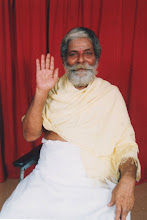Monday, August 31, 2009
Body Consciousness in Meditation
Friday, August 28, 2009
Through what method can one attain highest goal?
Thursday, August 20, 2009
Self is raised by the Self
Wednesday, August 19, 2009
When is a man said to have attained to Yoga?
Thursday, August 13, 2009
What sort of a man attains Brahman?
Monday, August 10, 2009
Being happy
Thursday, August 6, 2009
Resting in Brahman
Tuesday, August 4, 2009
How do wise men see Truth?
Commentary by Chinamayananda Swami:
The wise cannot but see and recognise the same presence of Divinity everywhere. The ocean has no difference in feeling for different waves. Gold cannot recognise itself as different in different pieces of ornaments. From the stand-point of mud, all mud pots are the same. Similarly, an egoless man, having recognised himself to be God, can find in no way, any distinction in the outer world of names and forms. The distinctions generally recognised, are all the distinctions of the containers. Man to man, there may be differences in form, shape and colour of the body, or the nature of the mind or the subtlety of the intellect. But as far as Life is concerned, It is the same everywhere, at all times.
Therefore, it is said in this stanza, that the Self-realised cast an equal eye on a Brahmana endowed with scholarship coupled with humility, on a cow, on an elephant, on a dog or on a pariah. Everywhere he realises the presence of the same Truth, whatever be the container.
Equal vision is the hall-mark of Realisation. The perfected cannot make distinctions based upon likes and dislikes. In and through all forms and situations, he sees the expressions of the same dynamic Truth which he experiences as his own Self.
Monday, August 3, 2009
Who will get liberated?
With a deep study of the Reality, the seeker in all his various personal identities, thereafter comes to live in unison with that understanding of the Divinity. His intellect gets, as it were, absorbed in That Knowledge and his mind cannot but sing the song of Godliness through everyone of its emotions. He becomes ever intent upon the Infinite Bliss which he has come to recognise as the essence in him. to such an individual the very Goal is nothing but the Self, which he has understood as illimitable and unlimited.
An individual who has thus educated himself upon the World-of-Truth within himself, shall thereafter, have no reason or chance to get caught up again in this world of likes and dislikes. This is the result of full PARTICIPATION in the studies. The next stage is to live up to what is understood from the studies; the active INVOLVEMENT in spiritual life. Then comes complete COMMITMENT.
How can we say that the ego will not rise again in such a man's bosom? The reason is indicated here, when Krishna qualifies such men as "THOSE WHOSE IMPURITIES HAVE BEEN SHAKEN OFF BY KNOWLEDGE." The impurities mentioned here are the vasanas which are the very materials with which the ego is conjured up. These vasanas together constitute what we philosophically call: "the ignorance of Spiritual Divinity." The antidote for ignorance is Knowledge. Thus, when, with the rise of the Knowledge of Spiritual Bliss, the dreary darkness of ignorance ends, the ego too comes to a total extinction from which it cannot re-start its career. Without a cause no effect is ever possible. In short, in this stanza, we are meeting the most optimistic philosophy in the world, declaring courageously that, Self-Realisation is the final experience in the pilgrimage of evolution, and that, in it, the evolver in us shall come to fulfil himself. God-realisation is the last stage of growth, and thereafter, to be the 'Supreme' is the goal of all evolutionary struggles, to achieve which, the ego, in its self-evolution, roamed about so long in the field of its own self-created world-of-finitude and imperfections!




